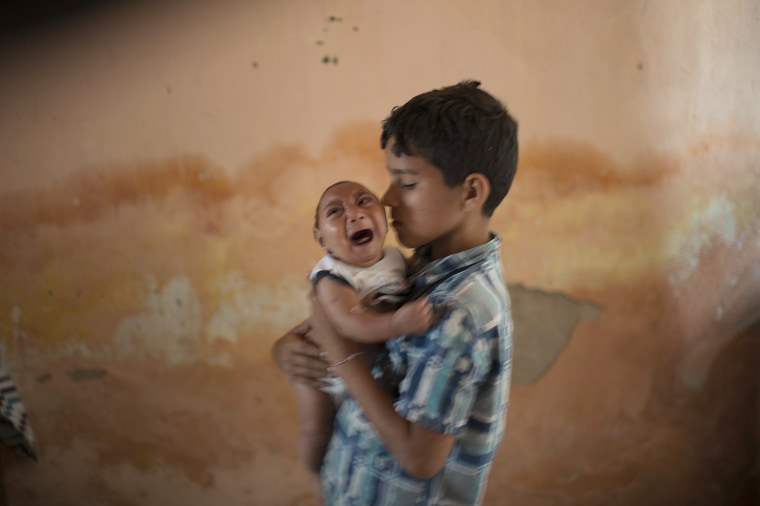Pregnant women should consider delaying trips to Latin American and Caribbean countries newly affected by the Zika virus, federal health officials said Friday night.
And doctors in the U.S. should keep an eye out for people with symptoms of Zika, the Centers for Disease Control and Prevention said.
It’s still not clear if the virus is causing severe birth defects but in the meantime, it’s probably safer for pregnant women to stay away, the agency said.
“Until more is known, and out of an abundance of caution, CDC recommends special precautions for pregnant women and women trying to become pregnant,” the agency said in its travel advisory. “Abundance of caution” means better safe than sorry.
“Pregnant women in any trimester should consider postponing travel to the areas where Zika virus transmission is ongoing. Pregnant women who must travel to one of these areas should talk to their doctor or other healthcare provider first and strictly follow steps to avoid mosquito bites during the trip,” it said.
“Women trying to become pregnant who are thinking about becoming pregnant should consult with their healthcare provider before traveling to these areas and strictly follow steps to prevent mosquito bites during the trip.”
“Pregnant women in any trimester should consider postponing travel to the areas where Zika virus transmission is ongoing."
These steps include wearing long sleeves, staying indoors as much as possible and using insecticides that include DEET. “Insect repellents containing DEET, picaridin, and IR3535 are safe for pregnant and nursing women and children older than 2 months when used according to the product label. Oil of lemon eucalyptus products should not be used on children under 3 years,” CDC said.
Zika had never before been known to cause birth defects or even serious illness. In fact, three quarters of people who get it don’t even know they ever had it. But since it showed up in Brazil last May, officials have noticed a clear increase in the number of cases of microcephaly, a birth defect that causes underdeveloped heads and brains.
Microcephaly kills babies, causes miscarriages and babies who survive are often severely disabled.
“According to Brazilian health authorities, more than 3,500 microcephaly cases were reported in Brazil between October 2015 and January 2016. Some of the affected infants have had a severe type of microcephaly and some have died. The full spectrum of outcomes that might be associated with infection during pregnancy and the factors that might increase risk to the fetus are not yet fully understood,” the CDC said.
"This is a new situation. This is a dynamic situation."
Zika’s been seen locally now in 14 countries, including Brazil, Venezuela, Mexico, Panama, Martinique and Haiti. Travelers have also carried it but a country is not considered to have Zika locally unless it’s clear someone’s been infected by a mosquito there.
The CDC said 12 people have been seen in the U.S. in 2015 and 2016 with Zika, but they were all travelers and did not get it here.
It sent out a separate advisory to doctors.
"With the recent outbreaks in the Americas, the number of Zika virus disease cases among travelers visiting or returning to the United States likely will increase. These imported cases may result in local spread of the virus in some areas of the continental United States, meaning these imported cases may result in human-to-mosquito-to-human spread of the virus," it said.
"Zika virus infection should be considered in patients with acute onset of fever, maculopapular(bumpy red) rash, arthralgia (muscle aches) or conjunctivitis, who traveled to areas with ongoing transmission in the two weeks prior to illness onset," CDC added.
"We do not yet understand the full spectrum of outcomes that might be associated with infection during pregnancy, nor the factors that might increase risk to the fetus.Additional studies are planned to learn more about the risks of Zika virus infection during pregnancy."
CDC’s regularly updating its website with specific advice.
"This is a new situation. This is a dynamic situation. I think we are just going to have to wait until this plays out," said the CDC's Dr. Lyle Petersen.
"We believe this is a serious problem," Petersen added in a telephone briefing with reporters.
"The virus is spreading fairly rapidly throughout the Americas."
The CDC's been working on the travel advisory since the middle of the week. The World Health Organization issued a milder one, simply warning anyone who's traveling to the region to avoid mosquito bites.
But with the evidence building of a potential link between infection and microcephaly, CDC wanted to answer the questions of worried American travelers.
CDC's Dr. Marty Cetron said the federal government wanted to give a heads-up to the countries that might be affected by any travel advisory. "We don't like to blindside partners," Cetron told reporters in a telephone briefing. "Given the large number of countries in the region, these consultations are important."

